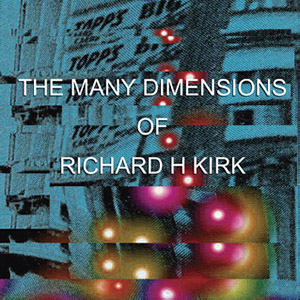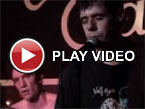Richard H. Kirk, "The Many Dimensions of Richard H. Kirk"
 With the reissue of the Cabs' mid-period work last year and Richard H. Kirk's revival of the name for some upcoming performances, this boxed set arrives at just the right time to help brush up on his voluminous solo projects. Compiling three albums released digitally in the past few years, it does an exceptional job at capturing at least part of his multiple personalities, and if nothing else demonstrates just how relevant he continues to be.
With the reissue of the Cabs' mid-period work last year and Richard H. Kirk's revival of the name for some upcoming performances, this boxed set arrives at just the right time to help brush up on his voluminous solo projects. Compiling three albums released digitally in the past few years, it does an exceptional job at capturing at least part of his multiple personalities, and if nothing else demonstrates just how relevant he continues to be.
Given that these three albums have all been available individually via various digital music services for the past few years, this set may be a bit less essential for some than others.Since I am not at all a fan of digital music distribution, I never picked up any of these albums individually, so this was all new to me.The 1960s compilation record titling is fitting, because it serves the same purpose without being a superfluous greatest hits record.
Reality is Opposite is the sound and style that I most associate with Kirk's post-CV career. Noisy samples, hard hitting beats, and cut up voices have been the bread and butter of his projects for years, and this disc heavily features all of it.His penchant for bent funk is all over these eight songs, from the guitar loop of "The Ghetto Child" to the wah-wah heavy effects on "The Young Men Have Guns."Pieces like "Make It On Down" and "Walkin Around" feature a sampled jazz drum loop, dropping the tempo on the latter and giving both a more than just straight-forward techno sound.
He pulls back the club friendly structures somewhat throughout, such as his decision to deeply bury the drums of "Tune In/Turn Off/Care Less," and the beat-less synth expanse of "New Level of Threat."The stripped down sequencing and heavy bass on "The Future Rising" stood out to me like a throwback to the early CV singles, updated with modern sounds but keeping that old, playful experimentation intact.
 
samples:
Umladen, as Orchestra Terrestrial, has Kirk dropping the beats and funk for a less contemporary, more 1970s sounding krautrock synth excursion."Feierlichkeit" is presented with vinyl surface noise atop pulsing bass and basic, melodic synth sweeps, resulting in a pensive, somewhat dour piece that heavily contrasts the militant thump of Reality is Opposite.Kirk factors a bit more rhythm into the equation on "Umladen" and "Zivil," although in the form of bleeping synth sequences rather than big beats.The latter’s inviting, almost catchy feel immediately made me think of '70s Kraftwerk covered in modern grime.
"Autoschlepp" also focuses on a modern ambient electronic sound, admittedly via a bitcrushed melody that keeps it just the right side of weird."Observatorium" and "Prophezeien" are built upon gentle passages of white noise and downtempo synth strings, especially on the former.They would fit in quite well as soundtrack work, but stand nicely on their own as well.
 
samples:
The final disc, Anonymized (via Richard H. Kirk and the Arpeggio 13), sits somewhere between the other two in terms of mood:the overt use of arpeggios maintains a sense of rhythm throughout, but in some cases they are so stretched out/processed the structure is almost invisible.Songs like "Gun Step Funeral Charge" are all jagged, clicky blips of synth noise that excel in their repetition and abrasiveness."Inclement Weather" has Kirk transforming the rapid notes from rhythm to melody as they become more elongated and processed.
"Those Officers" is an example of where the structuring becomes less about rhythm and more about mood and texture, with the arpeggiator allowing the tones to stretch out more."Shore Up the Defences" and "Uprising," on the other hand, sound heavily rooted in 1970s science fiction television:the simple bleeps and note progressions scream "this is the future because we are using synthesizers".This might give both a certain nostalgic value, but makes for dated sounding music.
Of the three, I found Reality is Opposite to be the most enjoyable, largely because it fits in closest with my previous experience with Kirk's work.That modern, updated take on 1970s American revolutionary imagery fits perfectly with current social conditions in the US, as does most of his favorite themes.The only thing that is added from the original digital releases other than the individual sleeves is the thick collage booklet of Kirk's standard lo-fi Photoshopped video art and a box that sits handsomely next to the recent CV live set he released, so those who own these digitally might not be easily persuaded to get the physical version.For those like me, however, who dabble in his catalogue and missed these the first time, it is a perfect way to grab three very different sounding, but distinctly Richard H. Kirk sounding albums.
samples:
 



